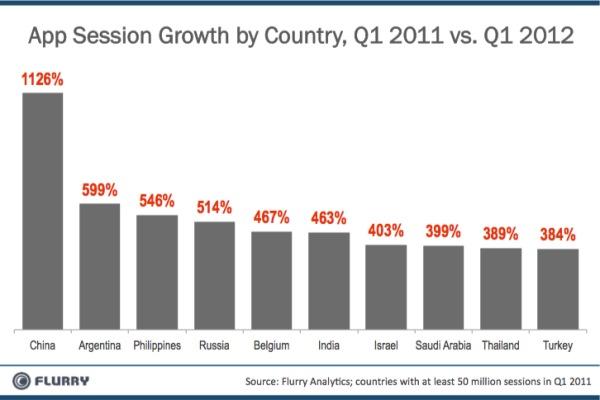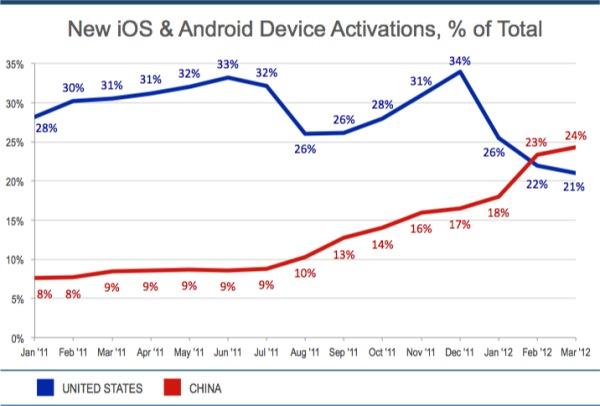In a report released on Wednesday, analytics firm Flurry found that in February Chinese mobile users activated more devices running the two top mobile operating systems, Apple's iOS and Google's Android, than any other country.
By tracking its entire data set of over 1 billion aggregated app sessions per day across 160,000 apps, Flurry was able to quantitatively measure the growth rate of device activations through software usage. An app session is characterized by the launch and use of a particular app, like opening a news reader and browsing articles for two minutes.
In looking at the 15 months following the first quarter of 2011, China gained 16 percent of the world market for new iOS and Android activations, jumping from 8 percent in January 2011 to an expected 24 percent by the end of March 2012. For comparison, the U.S. fell from a 28 percent share of new activations to 21 percent over the same period.
Interestingly, the growth of iOS and Android device activations in China remained fairly level until September 2011 when the country began its climb to the top. That month Apple launched the iPad 2 in China to an almost overwhelming demand that caused a brief suspension of sales due to rowdy crowds. The same rise in device activations was also seen in the U.S. during the same period, though a precipitous decline initiated in December brought the country's worldwide market share below China's by February.
China took passed the U.S. in February to become the world leader in iOS and Android activations. | Source: Flurry
Although the U.S. still trumps China in its installed iOS and Android user base, the rocketing adoption rate in China's burgeoning market is helping to close the gap between the two countries. Current estimates put the number of active devices in the Chinese market at less than half of the more saturated U.S. market, though the country's rocketing customer base has the potential to take the top spot and already boasts twice as many users than third-place U.K.
China is the second largest app economy and saw an amazing increase in app sessions over the past year, moving up from 7th place on a 1126 percent increase in app usage since the first quarter of 2011. To give a better perspective of China's staggering growth, the uptick in app use represents a figure nearly double that of next-fastest Argentina's 599 percent.

China's app use has grown an amzing 1126% over the past year to become the world's second-largest app economy. | Source: Flurry
Apple launched the iPhone 4S through its second official Chinese partner carrier China Telecom earlier in March, adding to the already strong sales seen from the country's number two carrier China Unicom.
Although not an official Apple partner, the world's largest wireless carrier China Mobile has reported that at least 15 million iPhones are being used on its network. The Cupertino, Calif., company is reportedly looking into a future deal with China Mobile, which would open the doors to the carrier's 600 million existing subscribers.
 Mikey Campbell
Mikey Campbell







-m.jpg)






 Charles Martin
Charles Martin

 Malcolm Owen
Malcolm Owen
 William Gallagher
William Gallagher

 Christine McKee
Christine McKee
 Wesley Hilliard
Wesley Hilliard








15 Comments
This is a massive opportunity, not a problem, for Apple. When China Mobile happens - as it no doubt will, with some compromises both sides - Android share will plummet. Samsung must dread the day.
A more interesting story would have been what Apple v. Samsung looks like in China Telecom and what the implications might be if similar patterns emerge in China Telecom.
All it really says is that a vast majority of Chinese consumers are currently largely stuck with Android as their only real choice, and those who are not are doing so because they can't afford a more expensive phone (which is understandable for a developing economy).
This would be an opportunity to create a Chinese app store. Or is there one already?
This only talks about use of IOS & Android compiled together by nation. How do you get anything about IOS v Android out of this article?
This is a massive opportunity, not a problem, for Apple. When China Mobile happens - as it no doubt will, with some compromises both sides - Android share will plummet. Samsung must dread the day.
A more interesting story would have been what Apple v. Samsung looks like in China Telecom and what the implications might be if similar patterns emerge in China Telecom.
All it currently says is that a vast majority of Chinese consumers are currently largely stuck with Android as their only real choice, and those who are not are doing so because they can't afford a more expensive phone (which is understandable for a developing economy).
Yet more cash that Apple can't bring into the States.
Apple can bring it all in, they just have to give some of it to their poor, bankrupt Uncle Sam.
Yet more cash that Apple can't bring into the States.